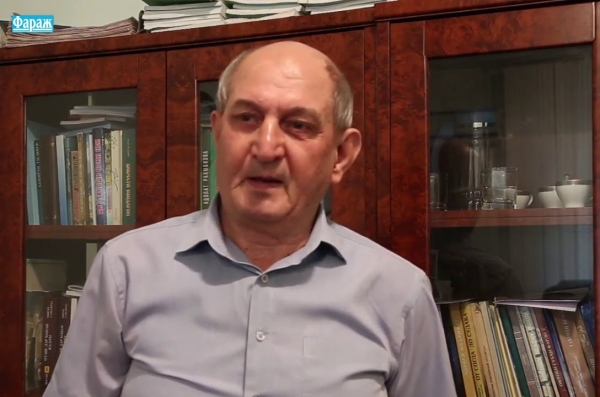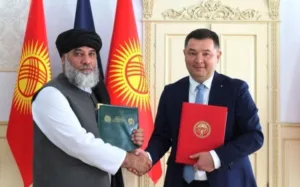
Photo: From "Faraj"
Five years ago, on August 13, 2020, Gulnazar Keldi, a national poet of Tajikistan, author of the National Anthem of the Republic, passed away. He is one of the most famous modern Tajik poets who has made a significant contribution to the development of Tajik literature, especially poetry for children.
But his most important work, of course, is the text of the national anthem of Tajikistan. In an interview with Asia-Plus a few years ago, the poet talked about how he wrote this text, where the inspiration came from, and how much he received for this work.
In 1991, after Tajikistan's independence was officially declared, it became necessary to update the state symbols: the national anthem, the flag and the coat of arms of the republic. The coat of arms and the flag were approved at the 16th session of the Supreme Council of Tajikistan in 1992. But with the anthem, the contest dragged on for another couple of years.
– Was it an official competition, with prizes and other attributes?
– Yes, it was announced that the three best works will be selected, which will be awarded with cash prizes. The main prize was one million rubles.
The competition was closed, and many scientists and poets participated in it. The commission that evaluated the contestants worked actively, and met frequently for discussions.
– And who was a member of the commission?
For example, Emomali Rahmon, Chairman of the Supreme Council, his deputy Abdulmajid Dostiev, scientists – Muhammadjon Shakuri, Abdulkadir Maniezov, Zohir Akhrorov, poets Askar Hakim, Mehmon Bakhti, Loik Sherali, Mumin Kanoat, Chairman of the Broadcasting Committee Ibrohim Usmonov and many others.
All the documents were registered by the poet Usmon Naziri Otash. The meetings were held under the leadership of Abdulmajid Dostiev. None of them, looking through the next proposed version, did not know who the author of the text was. Each participant offered his text under a pseudonym – this was the main condition of the competition.
I offered my texts under the pseudonym "Noshinos".
– Were only the texts proposed for consideration by the commission? Was there any talk of changing the music?
– No. At one of the meetings, Damir Dustmukhammedov, who was at that time chairman of the Union of Composers of Tajikistan, said that he did not consider it necessary to change the composition of Suleiman Yudakov. According to him, Yudakov's music is not just solemn, it is comprehensive.
And in the Soviet years, it was always said that the anthem of Tajikistan had the most beautiful music.
– It turns out that all the participants knew exactly what kind of music the words of the new anthem would play?
– Yes, and I was also guided by the composition of Suleiman Yudakov. Already during the contest, I once again opened the Tajik Encyclopedia and read the text of the anthem of Soviet Tajikistan.
The author of the former anthem, Ustod Lokhuti, wrote about the party, the Soviet people, and Lenin. But after the collapse of the Soviet Union, neither the party nor its ideology remained. Then I decided what to focus on in my poems.
By the way, even before the end of the contest, we were told that the poem should be very gentle, such as, for example, the prayer of a person praying to Allah. My first samples were like that. But then I decided that the anthem should not express the interests of any group, party, religion or personality. This text should be popular.
– How many of your texts did you offer at the contest?
– I think there are four or five texts. Ustod Loik Sherali suggested five or six. Gulrukhsor also participated in the competition. In total, according to my data, 114 works were offered. By the way, two of my texts were recognized as the best. The third prize was awarded to ustod Loik Sherali.
– So you got one million rubles for the anthem?
– One million was awarded. But the payment process was delayed. Sometime in December 1994, I went to the new Chairman of the National Bank of Tajikistan, Murodali Alimardon. Then Alimardon, in the presence of the representative of the Supreme Council, Kozidavlat Koimdodov, told me that there was no such money in the country's budget. The times were difficult back then.
The year 1995 came, and money was devalued. It was only in February 1995 that I started receiving my "millionth" award. In parts. If I'm not mistaken, already in the 95th year 445 thousand rubles were equal to 100 dollars.
I can say that I got 200 dollars for the anthem. But that doesn't matter to me at all. The main thing is that my poem is read by children and adults in our country and abroad. This is a real gift.
– How did your family accept your victory?
– Of course, they were happy. I remember one thing. In those days, as I said, it was very difficult. The new anthem had already started, and we couldn't find bread for two days. The children were small. And then one of my sons said, "Dad, you are the author of the national anthem of a country where there is no bread." To which I replied that everything was still ahead and our country would develop.
– We can say that the national anthem is a kind of passport of the country. As the author of the national anthem of Tajikistan, do you have any special benefits?
– The biggest gift is the love of the people. Every morning, when schoolchildren sing the national anthem, when the national anthem is played on television, I am happy. Sometimes people look at me wondering if this person is alive. But for me, the main gift is the recognition of people.
And as an author, I don't have any benefits. As a national poet of Tajikistan, every month I receive $50 from the Presidential Fund in addition to my pension.
– And about the knowledge of the national anthem. Recently, the media has been writing that when applying for a job, it is a prerequisite to know the anthem by heart. Do you, as its author, agree with this?
– In 2007, when I was a deputy, we adopted the law "On State Symbols of Tajikistan." This law states that the national pride of every citizen of Tajikistan is the highest respect for the flag, coat of arms and national anthem, including memorization of the national anthem.
If he is a citizen of Tajikistan and is proud of it, he should know the national anthem.
– 20 years have passed since the adoption of the anthem. New projects have emerged that have become a kind of ideology of the country. Have you come up with an idea to change the text of the anthem and, for example, sing Rogun in it?
– Great projects are not for the national anthem. Individual poets should write about projects such as Rogun, the Silk Road, and various tunnels. The essence of the national anthem is different. Imagine if we mention Rogun in the anthem, and when it is built, will we have to change the text again?
Back then, during the contest, there were poems that praised Bukhara and Samarkand. And if these texts had been taken for the national anthem, would we then have had to fight with Uzbekistan to regain Samarkand and Bukhara? No, the national anthem is something else, more subtle.




